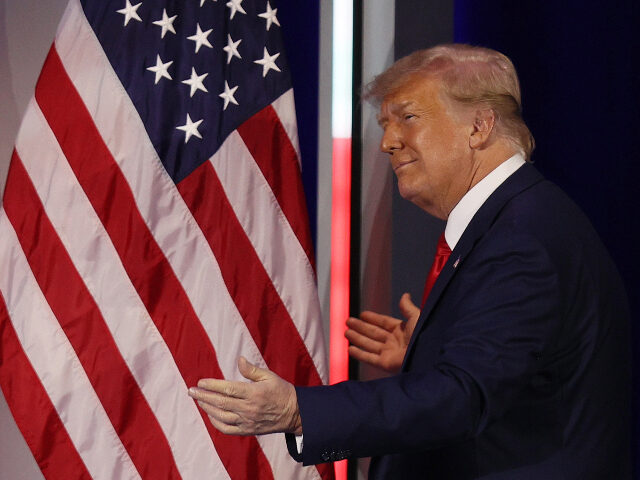Top New Hampshire politicians, including the speaker of the State House and State Senate president, sent a letter Tuesday to Secretary of State David Scanlan stating “there is no legal basis” to remove former President Donald Trump from the 2024 ballot using the Fourteenth Amendment, as anti-Trump legal scholars have suggested.
Senate President Jeb Bradley (R), New Hampshire House Speaker Sherman Packard (R), and former U.S. Sen. Bob Smith (R) headline the dozens of New Hampshire officials, including state senators, representatives, and executives, who signed the letter, which the Trump campaign shared via an emailed press release.
“President Donald J. Trump is once again at the forefront of political attacks, this time by those who are attempting to disqualify the former President from appearing on New Hampshire’s primary ballot by weaponizing Section Three of the Fourteenth Amendment against him,” the letter begins.
It continues:
Since 1920, New Hampshire has been a state that prides itself on being the First-in-the-Nation to hold their primary elections and setting the stage for the rest of the country. But that status is now in jeopardy because of an absurd conspiracy theory to deny President Trump, the current front-runner in New Hampshire, from being on the ballot.
There is no legal basis for these claims to hold up in any legitimate court of law. The opinions of those perpetuating this fraud against the will of the people are nothing more than a blatant attempt to affront democracy and disenfranchise all voters and the former President. These individuals who are seeking to deny voters access to support their candidate of choice are nothing more than political pawns of the Left doing their bidding, which is disappointing since the Democrat Party has continually tried to strip New Hampshire of its First-in-the-Nation status.
At the center of the argument to remove Trump from the ballot is the claim he partook in an insurrection on January 6, 2021. Section Three of the Fourteenth Amendment outlines that one who incites an insurrection is barred from holding office, though there is debate about if the statute applies to the president and vice president. The legal theory calls on secretaries of state and other local officials to bar Trump from their states’ presidential ballots.
As WMUR pointed out, Scanlan has met with failed New Hampshire GOP senate candidate Corky Messner, who was probing a legal challenge.
“When somebody makes a reasoned argument about what those provisions mean, I feel an obligation to at least listen to them,” Scanlan said.
“A decision of that magnitude that’s a decision of deciding that somebody is not qualified to run, a person, is extraordinary,” he added. “And it really has to be treated with that degree of importance.”
Special Counsel Jack Smith has twice indicted the 45th president on federal charges, including in relation to his election challenge, but none of his counts allege an insurrection of seditious conspiracy.
“Does anyone think special prosecutor Jack Smith would have refrained from charging that crime if he believed he could prove it in court?” the Wall Street Journal Editorial Board wondered in an op-ed last week that shot down the legal theory. “Instead, he has charged a conspiracy to overturn the election, but that is not a rebellion.”
Michigan Secretary of State Jocelyn Benson (D) acknowledged she was weighing the anti-Trump legal argument while speaking with MSNBC’s Deadline: White House with Nicole Wallace in August but raised concerns.
“If we’re not going to predicate this on conviction under the law, then what and how do we ensure due process? How do we define insurrection or rebellion? Who makes that determination?” asked Benson, who expressed that state officials must be “very careful in making decisions not from a political standpoint but from a legal standpoint.”
Tuesday’s letter also quotes Scanlan as saying he is “not seeking to remove any names from the presidential primary ballot.”
“We agree wholeheartedly, and we should continue to empower voters, not disenfranchise them,” the lawmakers added.
Some courts have ruled that this Disqualifications Clause of the Fourteenth Amendment is not self-executing, meaning that Congress must enact a law setting up the process to disqualify citizens under Section Three. Congress has never passed such a law.
Election law expert Hans von Spakovsky at the Heritage Foundation — who formerly served as a member of the Federal Elections Commission and, before that, as a lawyer in the Department of Justice Civil Rights Division — raises yet another objection. He explains that Congress passed two amnesty acts for citizens who would have been disqualified under Section Three — one in 1872 and another broader amnesty in 1898 — and argues that these two federal laws have completely nullified what would otherwise be the force of the Disqualifications Clause.

COMMENTS
Please let us know if you're having issues with commenting.